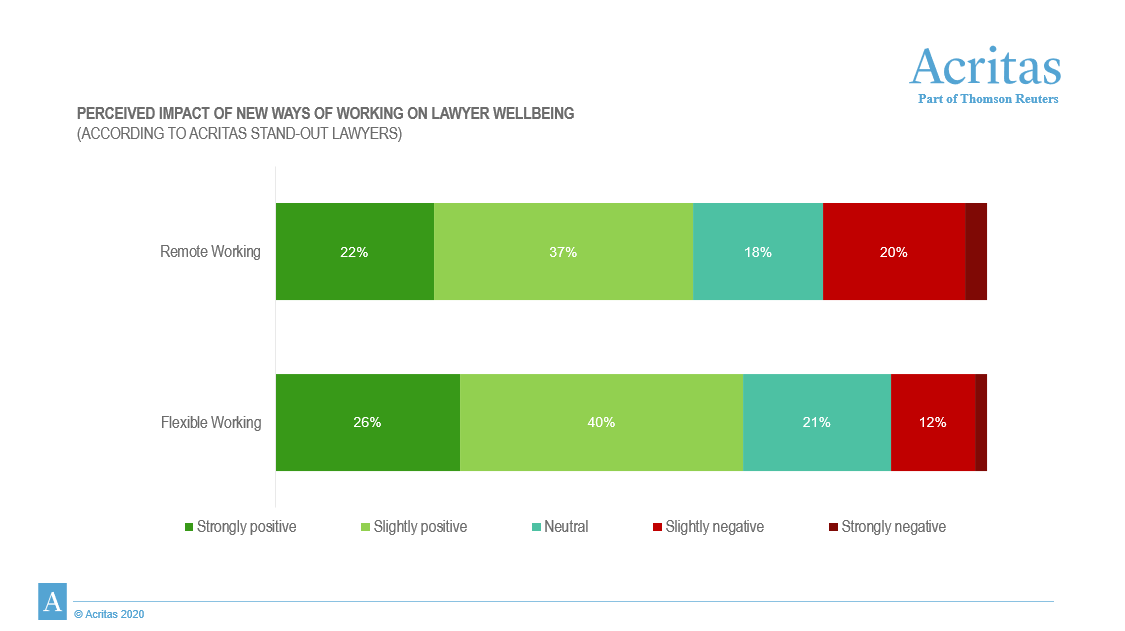Remote working has proven to be largely successful, at least from the perspective of lawyer well-being. But what has been its impact on lawyer productivity?
The impact of remote working on lawyer well-being explains why nearly 80% of stand-out lawyers say they want the ability to work from home at least one day a week even after the pandemic passes. This is more than double the percentage of lawyers who were working from home during all prior to lockdowns.
However, law firms shouldn’t let their office space leases lapse just yet.
On average, lawyers say they want to work remotely only 1 to 2 days a week. The benefits of working in the office keep lawyers from wanting to go all-virtual. While working remotely, many lawyers report struggling with business development, team management, talent development, collaboration, and finding a sustainable work-life balance.

In short, everything that forms the foundation of lawyer productivity is under attack. The challenge of lawyer productivity isn’t as easy as simply returning people to an office setting, however. Indeed, the mental and physical well-being of remote-working lawyers cannot be ignored, especially when 22% of them say they are willing to leave their current firm if it doesn’t allow lawyers to work remotely or flexible hours at least some of the time.
If law firms lean into hoteling and collaboration spaces, real estate capacity could be reduced by up to 38%; but, if law firms respond in this manner to keep talent satisfied, they also need to ensure that this strategy has no impact on productivity and on how clients are served.
So, the real challenge is this: How can firms help their lawyers be more productive, regardless of their working location?
Winning work while being virtual
When it comes to remote working, 77% of stand-out lawyers say the number one challenge to the firm’s bottom line is difficulty in developing business. Even in the best of conditions — which these are not — lawyers too often struggle to engage in business development conversations with clients. Many say this has been compounded today because lawyers are unable to leverage networking events, working lunches, and other in-person meetings.
Of course, some lawyers are thriving. And the latest research from Thomson Reuters Acritas, featuring more than 800 lawyers, revealed that lawyers who have thrived under these new working conditions are doing some things differently. These new strategies include:
Changing how they’re using firm content — Clients are looking for tailored advice that helps them keep their business operations going during these turbulent times. One stand-out lawyer stopped inviting her clients to the generic firm-wide webinars her firm was hosting, and instead started walking her clients through the content in a one-on-one setting to better tailor the content to the client and gain insights into their upcoming needs. She said nearly every one of her clients took her up on this offering, and it has led to her securing a number of new matters.
Adopting a personal client-communication plan — A fundamental component of getting considered for new work is to be top-of-mind for clients when new needs arise. One stand-out lawyer dedicates three hours every Wednesday to sending out personalized emails to his Top 50 clients. His reward? Ten new matters were opened in one month.
Being intentional about collaborating — Collaboration has proven to enable firms to more than double the share of spend they would normally get from a client. But collaborating — even when everyone is in the office — can be a challenge; and it works much better when taken in bite-sized pieces. For example, a team of 10 lawyers across disciplines can tackle the business implications of a specific statute and scale the solution across the firm much faster than training the entire partnership.
Tackling well-being when lawyers return to the office
Long hours have long been accepted as part and parcel of being a lawyer, even though it’s a proven detractor to the overall physical well-being of workers (lawyer or not). Pre-pandemic, 68% of lawyers reported working more than nine hours a day, as a matter of course.
The new conditions under which lawyers now work has shed light on the benefits of fewer hours and has had a positive impact on their well-being. Once the pandemic wanes, it will be critical to not fall into old habits once lawyers head back into the office.
Law firm leaders can play an important role here. Leadership and direction are critical to lawyer satisfaction, engagement, and well-being. To promote these positives, firms should focus on how they can i) build an inclusive culture; ii) encourage an open and transparent firm strategy; and iii) develop systems and incentives to encourage collaboration.
Lawyers themselves can help ease their own transition to the office and promote their own well-being by not working long days, taking breaks, organizing and planning ahead, and seeking out opportunities to collaborate.







